Clash of Titans
Games featuring a future Hall of Fame coach on each sideline.
November 15, 1913: Washington @ Oregon
Gil Dobie vs Hugo Bezdek
Gil Dobie learned football as an end for one season and quarterback for two on Dr. Henry Williams' Minnesota teams from 1900-1902 that went 28-3-2. He was described as a "quick and accurate passer and a swift runner." He also excelled at punting and returning punts. Williams respected Dobie enough to invite his former field general to become his assistant for three years while Gil earned a law degree. The attention to detail that the study of law required would serve him well as a football coach.
Dobie coached North Dakota Agricultural College for two undefeated seasons in 1906-07 before moving to Seattle to coach the University of Washington.
No one ever described Dobie as a "hail-fellow-well-met" person. "No nonsense" was the perfect summary of his personality.
If the players expected their new coach to ease them into their preseason workouts, they were sadly mistaken. Dobie worked them full throttle from the word go. He exercised total control of his players. However, a player rebellion never materialized because the Huskies experienced immediate success. A team that had not won more than four games in any of the previous four seasons went undefeated in 1908 with the only blemish being a 6-6 tie with rival Washington State. Thus did Washington win the first championship of the newly-formed Pacific Northwest Intercollegiate Conference.
No one would have predicted that the tie would be the only blemish on Washington's slate through the 1912 season. Dobie's record in his first 40 games was 39-0-1. The result was five straight Pacific Northwest championships.
One of Dobie's players would later describe his coaching philosophy like this.
Dobie's whole theory of offensive football was power with timing, mixed with just enough passing and deception to keep the secondary from moving immediately toward the ball carrier, thereby keeping the defense sufficiently off balance to give his power plays a chance to develop ... Backs were instructed and trained to go for three yards on a play, and anything more than that was just so much gravy. ...
On defense he placed his men in position which allowed for the least possible gamble. ... He liked a seven-man line and a box defense and relied on rushing the passer to take care of the extra eligible receiver. His line was taught to play the cup defense, and he worked constantly to develop a fast, aggressive charge on the part of the line.
On defense he placed his men in position which allowed for the least possible gamble. ... He liked a seven-man line and a box defense and relied on rushing the passer to take care of the extra eligible receiver. His line was taught to play the cup defense, and he worked constantly to develop a fast, aggressive charge on the part of the line.
Washington's 1913 team started, as many college teams did in those days, with a victory over a high school team. Then they played the "All-Navy" team and won 23-0. Whitworth College provided little opposition the next week, falling 100-0. Oregon Agricultural College (today's Oregon State) fell 47-0 before a rematch with Whitworth produced a 40-6 victory.
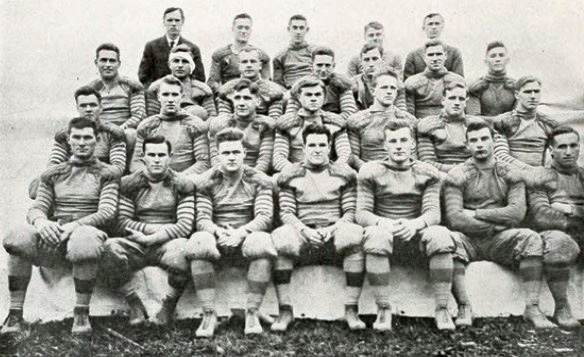
1913 Washington Huskies
Coach Dobie is at the left end of the back row.
(University of Washington Tyee Yearbook, Class of 1914)
That cleared the decks for the Huskies' first road game of the season – the annual meeting with Oregon. Hugo Bezdek's second Webfoots team was 3-1-1 with the tie being against Oregon Agricultural 10-10. So comparative scores favored Washington by a large margin.
A native of Bohemia, Bezdek was in the same league as Dobie in being cantankerous, demanding, and hard to please. Hugo played at Chicago in 1904-05 and reportedly caused legendary Coach Amos Alonzo Stagg, who abhorred profanity, to break his rule.
1913 began Bezdek's second stint as Oregon coach, the first being 1906, when he led the team to a 5-0-1 record before returning to Chicago for a season as Stagg's assistant and a four-year stint as Arkansas head coach.
One of Bezdek's players from later in his career said that Hugo drove his players so hard during the week that playing the game on Saturday was a relief. Each Tuesday was known as "Bloody Tuesday" because the players scrimmaged until half dead. Each practice ended in a half hour of wind sprints. He was even known to hold a full practice the day of the game.
Bezdek seldom praised a player. All opposing coaches were classified as villains who practiced dirty tricks and might spy on Bezdek's practices. During the course of his career, he would have clashes with other coaches, including the legendary Pop Warner.
Hugo stressed defense, believing in the principle that, "They can't beat you if they can't score on you." He would give Dobie's Washington teams their toughest competition.
However, Bezdek also believed in forward passing. After his 1908 Arkansas team lost to St. Louis because the Billikens were one of the earliest teams to use passing as a major weapon, Bezdek asked Stagg to come to Arkansas and teach the pass, which he then incorporated into his own offense.
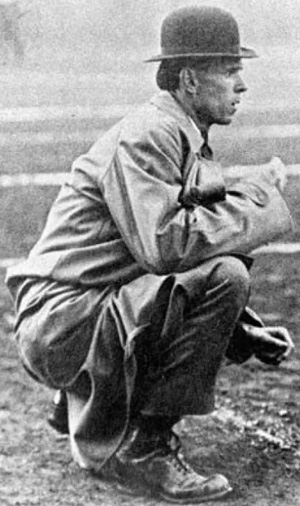
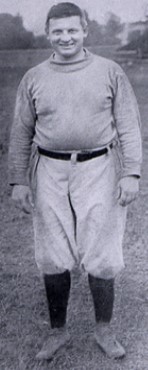
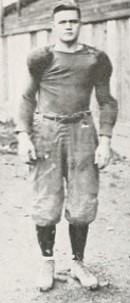
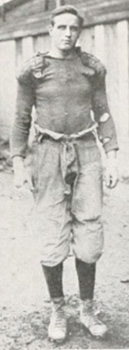
L-R: Gil Dobie, Hugo Bezdek, Cedric Miller, Wayne Sutton
(Bezdek picture from University of Oregon Oregana Yearbook, Class of 1915;
Miller and Sutton pictures from University of Washington Tyee Yearbook, Class of 1914)
With a week off before the Oregon game, Dobie scouted the Oregon Agricultural-Oregon game himself. The Webfoots had to come from behind to tie the game in the fourth quarter 10-10 against a team Washington had beaten 47-0 three weeks earlier. But Dobie wasn't about to let his squad take victory for granted. Gil told a reporter, "Bezdek's men played magnificent football. The Oregon team is better than I ever imagined they could be. ... They are heavier and faster than ever before in their history."
Washington was a three to one favorite to win the "Premier Northwest Football Struggle of Season" (Portland Oregonian) at Multnomah Field in Portland where Oregon played its biggest rivals to accommodate larger crowds. "500 rooters and a large number of coeds" made the trip from Seattle to Portland for the clash. The roundtrip train fare was $7.50 and a seat in the student section cost 75 cents.
Washington Grounds Out Touchdown
Oregon was plagued by penalties throughout the contest–45y for offsides and 15 more for holding. The teams exchanged punts until Washington HB Cedric "Hap" Miller, who returned to the lineup after an injury, tried a fake punt, which netted 7y and a first down to continue the possession. With Miller and Wayne Sutton taking turns carrying the ball, the Huskies reached the two, and Miller carried it over from there. Charles Smith added the extra point to make it 7-0 Washington.
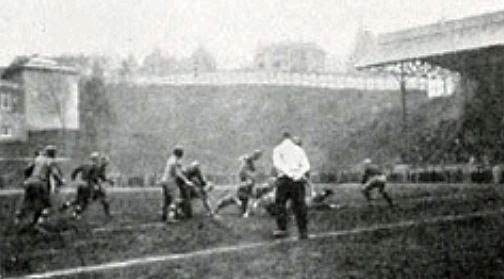
Washington-Oregon Action (University of Washington Tyee Yearbook, Class of 1914)
Oregon Capitalizes on Turnover
As you'd expect from a team with a master punter as their coach, Oregon won the punting battle as Carl Fenton outkicked Washington's Sutton. So the Huskies had to traverse more yardage to get into scoring range. Still, they worked the ball to the Oregon 10. But the defense held for three downs, and a fourth-down pass went awry. Fenton then boomed a 55y punt to Washington's 40. That initiated a series of plays that resulted in an Oregon touchdown. On the first play, Frank Jacquot fumbled, and Fenton recovered. Runs by Leo Malarkey and "miniature quarterback" Anson Cornell put the ball on the Washington 37. Suddenly RHB John Parsons broke through the right side of the Husky line and raced through the entire defense to the end zone. Fenton booted the tying point to make it 7-7.
Washington elected to kickoff after the touchdown and almost got a score out of it. Oregon E Robert Bradshaw fumbled the kick and ran back of his own goal line to recover the ball and take it to the 10. Two plays later, Fenton punted 50y, and Smith returned 10y. Following three runs for 15y, Smith tried a forward pass that Sam Cook intercepted on his 15. The half ended a few minutes later. Washington 7 Oregon 7
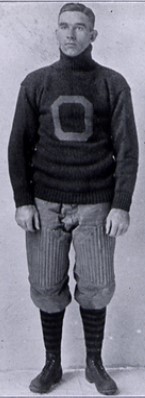

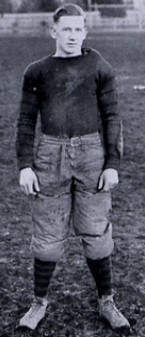
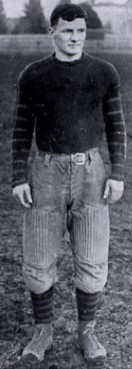

L-R: Carl Fenton, Leo Malarkey, Anson Cornell, John Parsons, Robert Bradshaw
(All pictures from University of Oregon Oregana Yearbook, Class of 1915)
After an exchange of punts to open the third quarter, Washington took possession at midfield. Miller, Jacquot, and Smith tore off a combined 20y. Miller then threw a forward pass to Sutton to put the ball on the 20. But on third down, Miller threw an incompletion in the end zone, which gave Oregon the ball on the 20.
Minutes later, Fenton punted 45y to Washington's 25. But the advance ended when Miller again failed to connect on a pass into the end zone. The quarter ended with Washington on Oregon's 35.
Despite the fact that Dobie made not a single substitution the entire game, his grueling conditioning program paid off when his Huskies won the fourth quarter.
Washington's repeated line plunges carried the ball to the 23. From there, Smith dropped back and booted a field goal from placement to put the Huskies ahead 10-7.
Minutes later, Washington turned the ball over on downs on its 45. Three runs by Parsons made its fourth-and-two. So Fenton set up to placekick a field goal to tie the game. But a wide snap from center forced Fenton to rush the kick to avoid two rushers, and the pigskin sailed wide.
Oregon got the ball back on a punt with four minutes left. Parsons got loose for 15y, but a pass that Fenton directed at Bradshaw was picked off by C Van Presley. Washington ran out the final minute to cement the victory.
Final score: Washington 10 Oregon 7 "in one of the hardest-fought contests ever played in the Northwest" (Seattle Daily Times).
The game would prove to be the closest margin of victory for Dobie in his remarkable nine-year run as Washington coach.
The Huskies would complete their undefeated season the following week with a 20-0 shutout of Washington State. Opponents scored only 20 points in the seven games.
References:
Great College Football Coaches of the Twenties and Thirties, Tim Cohane (1973)
From Orphanage to National Champion: Gilmour Dobie Pursuit of Perfection, Lynn Borland (2010)
Go Huskies! Celebrating the Washington Football Tradition, W. Thomas Porter (2013)
Great College Football Coaches of the Twenties and Thirties, Tim Cohane (1973)
From Orphanage to National Champion: Gilmour Dobie Pursuit of Perfection, Lynn Borland (2010)
Go Huskies! Celebrating the Washington Football Tradition, W. Thomas Porter (2013)